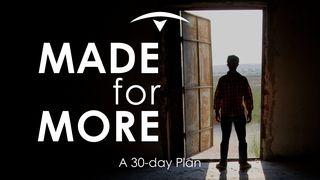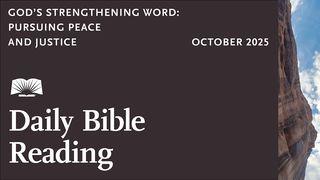A Journey Through the Book of JoshuaSample

Caleb Receives His Inheritance
After the summary of the conquest under Joshua and the note in Joshua 12:1–13:7 that much of the land had yet to be taken, the author of the book of Joshua begins to describe how land and cities were allotted to each tribe of Israel. He begins by describing what was given east of the Jordan River to the Reubenites, Gadites, and half the tribe of Manasseh (vv. 8–33). Moses had already distributed this land (Num. 32), but the author of Joshua includes it again to make a theological point. Since the land belonging to the Reubenites, Gadites, and the half-tribe of Manasseh had not been conquered during the invasion of Canaan, the Israelites might have viewed these tribes east of the Jordan as having a lesser share in the nation. By including this allotment, the author of Joshua stresses that they, too, were part of Israel and that the unity of the people of God against their enemies would be necessary for success in the years ahead.
Today’s passage gives the first allotment of the land west of the Jordan that Joshua conquered. In distributing this land, Joshua first gave territory to the tribe of Judah, specifically the family of Caleb (Josh. 14:6–15). This was right because Judah was the leading tribe in Israel. Israel’s promised ruler would come from Judah, and Judah was the tribe to lead the other Israelite clans into battle (Gen. 49:8–12; Judg. 1:1–2).
Caleb was also “the son of Jephunneh the Kenizzite” (Josh. 14:6). Genesis 15:19 mentions the Kenizzites as inhabitants of Canaan, so Caleb might have been the son of a man who was not an Israelite by birth but who trusted in Yahweh and joined the tribe of Judah by marriage. The word “Kenizzite” can also mean “son of Kenaz,” in which case Caleb would have been of full Israelite heritage.
While we are not certain of Caleb’s ancestry, we know that he was a man of great faith. Besides Joshua, Caleb was the only spy sent into Canaan by Moses who believed in God’s promise that Israel would conquer the promised land. He was promised an inheritance because of his great faith (Num. 13). Caleb asked Joshua for the portion of the hill country that included Hebron, a territory southwest of Jerusalem, and Joshua granted it to him (Josh. 14:6–15). The text shows that Caleb’s faith remained strong when he received the land forty-five years after first spying out Canaan. He attributed his long life to God’s sustaining power and remained confident in God’s promise to give all of Canaan to Israel. May we likewise hold fast to God’s Word and trust His sustaining providence.
CORAM DEO Living before the face of God
True faith in God recognizes that everything we have, including our lives, comes from His hand. True faith in God also rests on the promises of the Lord, believing what He has revealed. If we have the kind of faith that pleases God, we must trust Him enough to believe His promises, including those to reward His servants (Heb. 11:6), and we must recognize that we owe everything to Him daily.
Scripture
About this Plan

When God’s people entered the promised land, they faced mighty foes from which only the Lord could protect them. This 25-day study walks through the book of Joshua, which teaches about God’s faithfulness in fulfilling His promises, even amid strong opposition. This book points us ultimately to God’s unfailing promise of delivering His people into the greater promised land: the new heavens and new earth.
More
We would like to thank Ligonier Ministries for providing this plan. For more information, please visit: https://ligonier.org/youversion
Related Plans

Amazed

Crying Out to the God Who Hears

Reimagine Transformation Through the Life of Paul

Turn Your Eyes: Chapel Sessions Vol. 2 Devotional From Gateway Worship

The Creator's Battle: Winning the Inner War for Your Art

Made for More: 30 Days of Experiencing More Life, Love, and Freedom

Power at Sunrise: 30 Days of Reconstructing Your Life With the Word

God’s Strengthening Word: Pursuing Peace and Justice

TLV Daily Proverbs With Daniah
